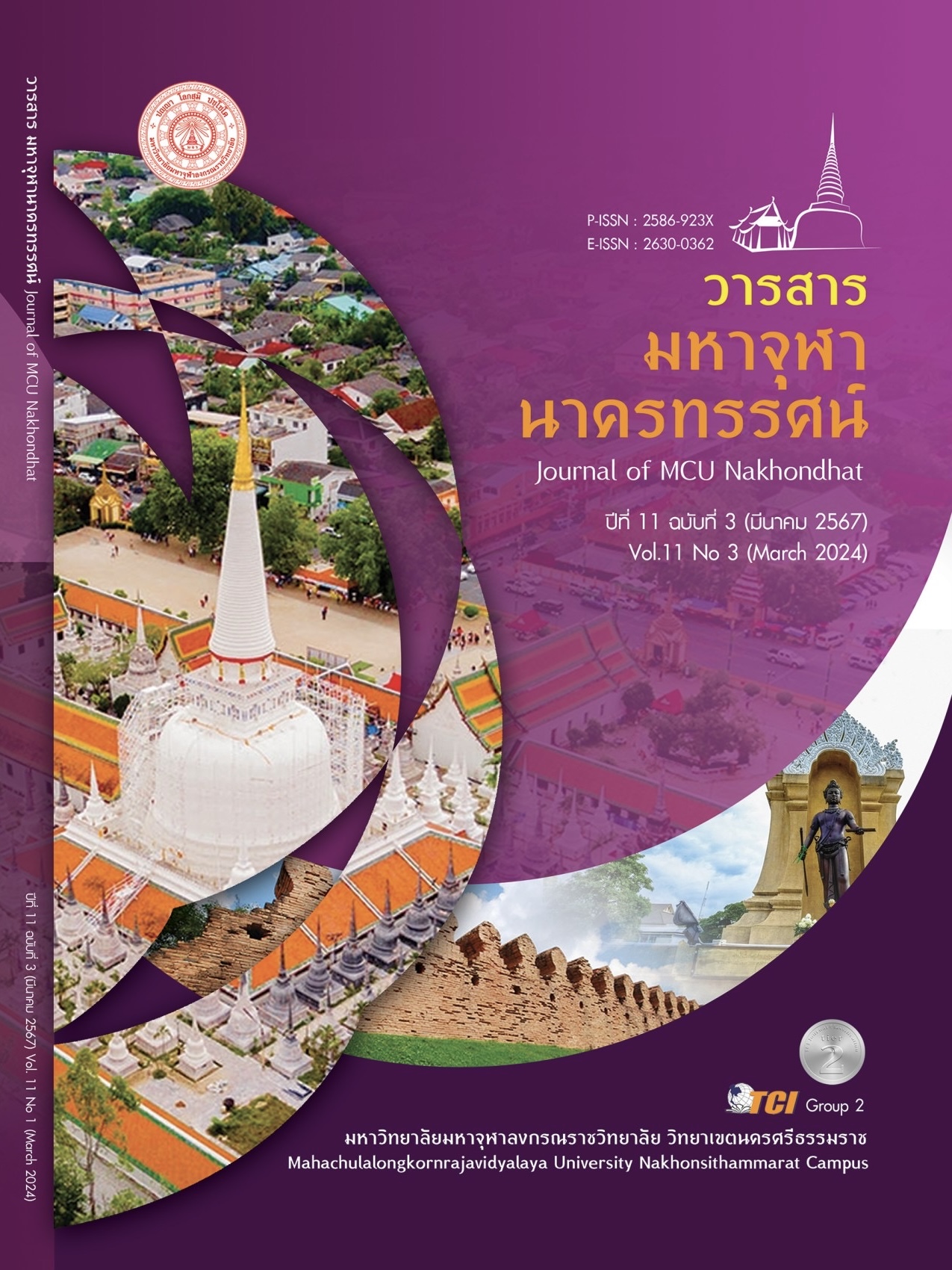USING BUDDHIST INNOVATIONS TO SOLVE POLITICAL AND ADMINISTRATIVE PROBLEMS
Main Article Content
Abstract
This article deals with administrative conflicts. with the political behavior of politicians Therefore, we must rely on the principles of Buddhism to apply and support behavior change. To solve political and administrative problems with the objective To resolve political and administrative conflicts From the political behavior of politicians By using Buddhist principles as innovations in solving problems. Especially the principles taken from the Tripitaka, principles of administration and control of the body and mind of a ruler who has morality in governing those under his command. The important principles of governance according to Buddhism are: 1) The principle of Iddhipāda, meaning that one must be satisfied with the work one is managing, and Viriya, that is, one must be diligent and diligent. Work with effort, strength, and patience. Citta means paying attention to one's work and duties in order to achieve success. Vimansa means diligently thinking and considering the reasons for that. Use wisdom to ponder what is wrong and what is right, and 2) the Brahmavihāra principle: kindness, having true love and good wishes for the people, kindness, helping. And with full ability to help, with compassion, there is support and morale boosting. with words or praise in other ways, with equanimity and fairness in all aspects of administration Emphasis is placed on honesty and verifiability and the 4 principles of bias. This is important, which is to abstain from this bias absolutely: Chantakati, biased because of liking, Dosakati, biased because of hate, deluded, biased, biased because of delusion or ignorance, and Bhayakati, biased because of fear. They may be afraid because they have money, gold, and power. Therefore, it is a Dhamma principle that emphasizes responsibility towards the group and unity.
Article Details

This work is licensed under a Creative Commons Attribution-NonCommercial-NoDerivatives 4.0 International License.
References
กาญจนา แสงลิ้มสุวรรณ. (2555). นวัตกรรมทางสังคมมีประโยชน์มากกว่าที่คิด. วารสารนักบริหาร มหาวิทยาลัยกรุงเทพ, 32(3), 12-15.
เกียรติศักดิ์ แสงอรุณ. (2563). รูปแบบการใช้หลักพุทธธรรมพัฒนานวัตกรรมประชาธิปไตยในสถานศึกษา. วารสารสังคมศาสตร์และมานุษยวิทยาเชิงพุทธ, 5(7), 40-53.
จำนงค์ ทองประเสริฐ. (2520). แบบเรียนศาสนาสากล. กรุงเทพมหานคร: สำนักพิมพ์วัฒนาพานิช.
เจริญชัย กุลวัฒนาพร. (2564). การออกแบบระบบงานและการวิเคราะห์งานเพื่อความสำเร็จของการจัดการองค์กร. วารสารปัญญาปณิธาน, 4(3), 52-64.
ชัยเสฎฐ์ พรหมศรี. (2550). การจัดการความขัดแย้งในองค์กร. กรุงเทพมหานคร: ออฟเซ็ทครีเอชั่น จำกัด.
ชานนท์ โกมลมาลย์. (2561). นวัตกรรมทางสังคมเพื่อขับเคลื่อนสุขภาวะโดยการมีส่วนร่วมของเด็กและเยาวชน. วารสารสังคมสงเคราะห์ศาสตร์, 26(1), 120-145.
ชื่นฤทัย กาญจนะจิตรา และวาสนา อิ่มเอม. (2546). นวัตกรรมทางสังคม : ทางเลือกเพื่อประเทศไทยรอด. วารสารสถาบันวิจัยระบบสาธารณะสุข, 1(3), 145-148.
ธีรภัทร์ เสรีรังสรรค. (2561). วัฏจักรของ 4 ระบอบการเมืองแบบผสมผสานราชาธิปไตย อำมาตยาธิปไตย ธนาธิปไตย และประชาธิปไตย. เรียกใช้เมื่อ 15 มกราคม 2564 จาก https://kpilib.com/library/books /kpibook-17215/
พระครูปลัดสุวัฑฒนพรหมจริยคุณ (คํามาก). (2563). พระพุทธศาสนากับการพัฒนาทางการเมืองการปกครองในสังคมไทย. วารสารปัญญาปณิธาน, 5(1), 1-14.
พระครูอุปกิตปริยัติโสภณ (สุข อุปการะ). (2565). พระพุทธศาสนากับการเมือง. วารสารนิตยสารเสียงธรรมจากมหายาน, 8(1), 1-17.
พระธรรมปิฎก (ป.อ.ปยุตฺโต). (2542). พระพุทธศาสนาพัฒนาคนและสังคม. กรุงเทพมหานคร: โรงพิมพ์กรมการศาสนา.
พระพรหมคุณาภรณ์ (ป.อ. ปยุตฺโต). (2549). พุทธธรรม. กรุงเทพมหานคร: โรงพิมพ์บริษัท สหธรรมิก จำกัด.
พระสมุห์พงศธร ปภงฺกโร. (2564). การประยุกต์ใช้หลักอิทธิบาท 4 การบริหารงานของเทศบาลกุดจับ อําเภอกุดจับ จังหวัดอุดรธานี. ใน วิทยานิพน์หลักสูตรพุทธศาสตรมหาบัณฑิต สาขาวิชาพระพุทธศาสนา. มหาวิทยาลัยมหาจุฬาลงกรณราชวิทยาลัย.
ไพบูลย์ สุขเจตนี. (2562). การเมืองการปกครองตามแนวพระพุทธศาสนา. วารสารวิจัยวิชาการ, 2 (2), 163-175.
ราชบัณฑิตยสถาน. (2546). พจนานุกรมศัพท์ศาสนาสากล. กรุงเทพมหานคร: บริษัท นานมีบุ๊คส์พลับลิเคชั่นส์ จำกัด.
สมบูรณ์ สุขสำราญ. (2527). ความขัดแย้งทางการเมืองและบทบาทของพระสงฆ์กรุงเทพมหานคร. กรุงเทพมหานคร: สมาคมสังคมศาสตร์แห่งประเทศไทย.
สำนักงานเลขาธิการสภาผู้แทนราษฎร. (2557). การพัฒนาการเมืองการปกครองในระบอบประชาธิปไตยกลุ่มงานผลิตเอกสาร สำนักประชาสัมพันธ์. เรียกใช้เมื่อ 15 มกราคม 2567 จาก https://dl.parliament.go.th/ handle/20.500.13072/547682
สุขุม นวลสกุลิ และคณะ. (2564). รัฐศาสตร์ตามแนวพุทธศาสตร์. เรียกใช้เมื่อ 15 มกราคม 2567 จาก http://psiba.blogspot.com/political-science-in-buddhist-approach.html
สุชีพ พิริยสมิทธิ์. (2547). พุทธศาสนากับรัฐศาสตร์. เรียกใช้เมื่อ 25 ตุลาคม 2566 จาก http://kengkkoo. blogspot.com/2013/03/blog-post_7235.html
Prof, S.N. (1999). Modern Comparative Politics. New Delhi: Prentice Hall of India Prive Ltd.


